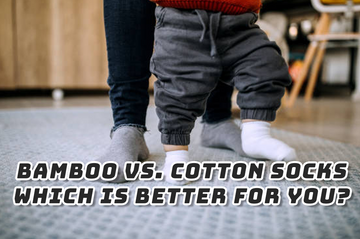Bamboo vs. Cotton Socks: Which is Better for You?
Choosing the right socks can significantly impact your comfort, foot health, and even your carbon footprint. Bamboo and cotton are two of the most popular materials for socks, each with unique benefits. Let’s dive into a side-by-side comparison to help you decide which is better suited for your lifestyle and needs.
1. Comfort and Softness
-
Bamboo Socks:
- Bamboo fibers are incredibly soft, often likened to cashmere or silk.
- Naturally smooth fibers reduce friction, making bamboo socks ideal for sensitive skin or those prone to blisters.
- Lightweight yet durable, they retain their softness even after repeated washes.
-
Cotton Socks:
- Cotton is soft and breathable, providing everyday comfort.
- High-quality organic cotton offers enhanced softness, but standard cotton can feel rougher over time.
Winner: Bamboo takes the lead for its superior softness and skin-friendly properties.
2. Moisture Management
-
Bamboo Socks:
- Highly moisture-wicking, bamboo fibers pull sweat away from the skin, keeping feet dry and comfortable.
- Naturally antibacterial, they prevent odor and reduce the risk of fungal infections.
-
Cotton Socks:
- Cotton absorbs moisture but doesn’t wick it away as efficiently as bamboo.
- Wet cotton socks can feel heavy and lead to odor if worn for extended periods.
Winner: Bamboo excels in moisture control and odor prevention.
3. Temperature Regulation
-
Bamboo Socks:
- Bamboo fibers are thermoregulating, keeping your feet cool in summer and warm in winter.
- Their breathability ensures optimal airflow, reducing overheating.
-
Cotton Socks:
- Cotton is breathable but lacks the insulating properties of bamboo.
- Cotton socks may not provide the same level of warmth in colder months.
Winner: Bamboo offers better year-round temperature control.
4. Durability
-
Bamboo Socks:
- Naturally strong fibers withstand wear and tear, maintaining shape and softness longer.
- Resistant to pilling and shrinking when cared for properly.
-
Cotton Socks:
- Cotton is durable but prone to shrinking and fading with frequent washing.
- Blended cotton options may offer improved longevity.
Winner: Bamboo is more durable, especially for long-term use.
5. Eco-Friendliness
-
Bamboo Socks:
- Bamboo is a highly renewable resource that requires minimal water and no pesticides to grow.
- Biodegradable and sustainable, bamboo socks are an eco-conscious choice.
-
Cotton Socks:
- Conventional cotton farming uses significant amounts of water, pesticides, and fertilizers, which can harm the environment.
- Organic cotton is a better option but still requires more water than bamboo.
Winner: Bamboo is the clear winner for sustainability.
6. Cost
-
Bamboo Socks:
- Typically priced higher than regular cotton socks due to their premium features and eco-friendly production.
- Available at competitive prices when bought in bulk, like the GENTLEAGU bamboo sock collection.
-
Cotton Socks:
- More affordable in general, with a wide range of options for everyday wear.
Winner: Cotton may be more budget-friendly, but bamboo offers better value for its features.
Who Should Choose Bamboo Socks?
- People with sensitive skin or allergies.
- Those looking for sustainable, eco-friendly products.
- Individuals who need moisture-wicking, odor-resistant socks for daily or active use.
Who Should Choose Cotton Socks?
- Those seeking affordability and basic everyday comfort.
- Fans of thicker, cushier socks for cold weather (opt for organic cotton for added softness).
The Verdict
While both bamboo and cotton socks have their merits, bamboo socks stand out as the better choice for those prioritizing comfort, moisture control, durability, and sustainability. Cotton socks, particularly organic varieties, remain a reliable option for budget-conscious consumers or those who prefer classic materials.
Explore our bulk bamboo socks for premium quality, eco-friendly comfort tailored to your needs!
